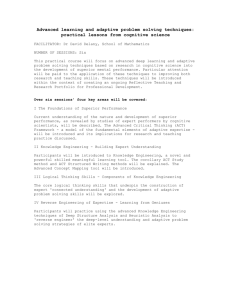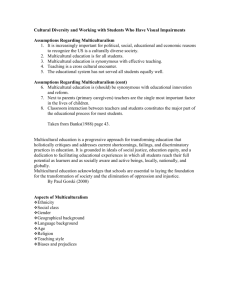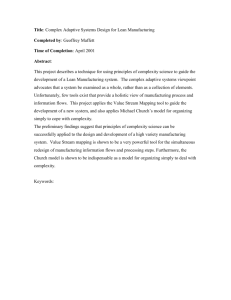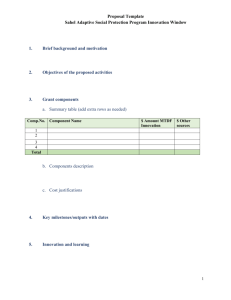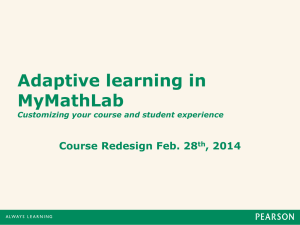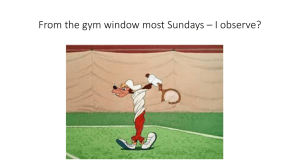Juha Oksanen, Maria Lima-Toivanen, Nina Rilla, and - EU-SPRI
advertisement
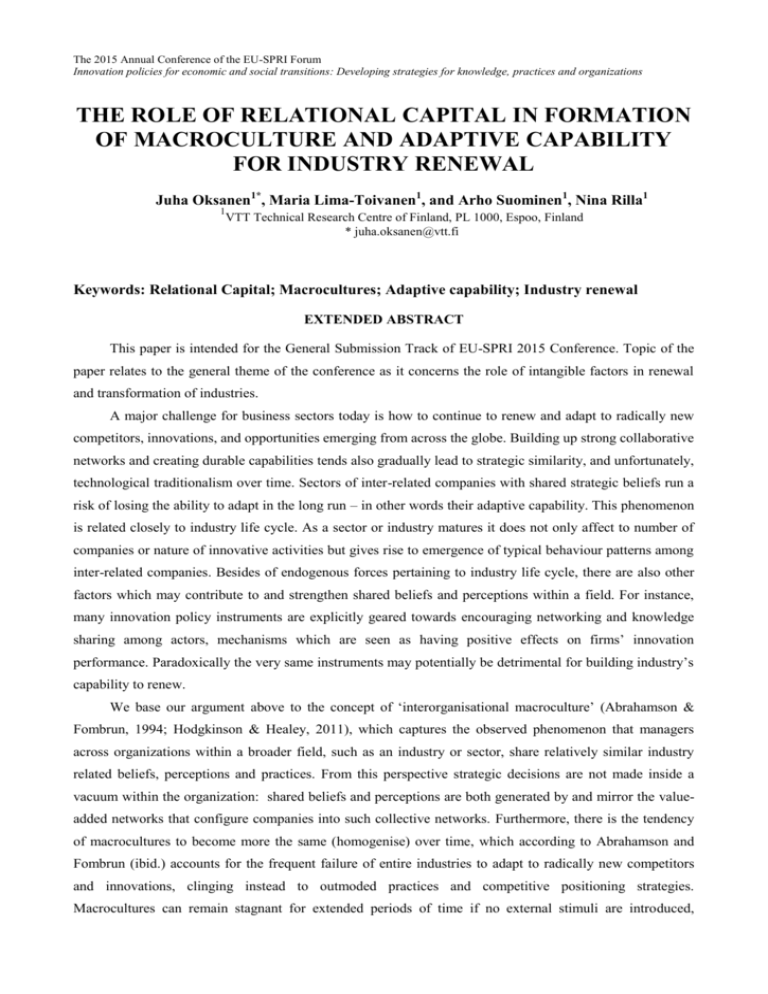
The 2015 Annual Conference of the EU-SPRI Forum Innovation policies for economic and social transitions: Developing strategies for knowledge, practices and organizations THE ROLE OF RELATIONAL CAPITAL IN FORMATION OF MACROCULTURE AND ADAPTIVE CAPABILITY FOR INDUSTRY RENEWAL Juha Oksanen1*, Maria Lima-Toivanen1, and Arho Suominen1, Nina Rilla1 1 VTT Technical Research Centre of Finland, PL 1000, Espoo, Finland * juha.oksanen@vtt.fi Keywords: Relational Capital; Macrocultures; Adaptive capability; Industry renewal EXTENDED ABSTRACT This paper is intended for the General Submission Track of EU-SPRI 2015 Conference. Topic of the paper relates to the general theme of the conference as it concerns the role of intangible factors in renewal and transformation of industries. A major challenge for business sectors today is how to continue to renew and adapt to radically new competitors, innovations, and opportunities emerging from across the globe. Building up strong collaborative networks and creating durable capabilities tends also gradually lead to strategic similarity, and unfortunately, technological traditionalism over time. Sectors of inter-related companies with shared strategic beliefs run a risk of losing the ability to adapt in the long run – in other words their adaptive capability. This phenomenon is related closely to industry life cycle. As a sector or industry matures it does not only affect to number of companies or nature of innovative activities but gives rise to emergence of typical behaviour patterns among inter-related companies. Besides of endogenous forces pertaining to industry life cycle, there are also other factors which may contribute to and strengthen shared beliefs and perceptions within a field. For instance, many innovation policy instruments are explicitly geared towards encouraging networking and knowledge sharing among actors, mechanisms which are seen as having positive effects on firms’ innovation performance. Paradoxically the very same instruments may potentially be detrimental for building industry’s capability to renew. We base our argument above to the concept of ‘interorganisational macroculture’ (Abrahamson & Fombrun, 1994; Hodgkinson & Healey, 2011), which captures the observed phenomenon that managers across organizations within a broader field, such as an industry or sector, share relatively similar industry related beliefs, perceptions and practices. From this perspective strategic decisions are not made inside a vacuum within the organization: shared beliefs and perceptions are both generated by and mirror the valueadded networks that configure companies into such collective networks. Furthermore, there is the tendency of macrocultures to become more the same (homogenise) over time, which according to Abrahamson and Fombrun (ibid.) accounts for the frequent failure of entire industries to adapt to radically new competitors and innovations, clinging instead to outmoded practices and competitive positioning strategies. Macrocultures can remain stagnant for extended periods of time if no external stimuli are introduced, resulting in a detrimental influence to organizational performance in face of sudden or sharp changes in operating environment. The notion of interorganisational macrocultures may provide an explanation for why we sometimes observe stagnation, industry decline and inadequate levels of innovativeness in industries and innovation systems that appear well-developed. Theoretically, the socio-cognitive macroculture perspective is part of neo-institutional theory, based on the premise that action follows mimetic and normative forces in organizational fields (DiMaggio & Powell, 1983). In addition, the definition of the term macroculture is closely aligned with the term ‘institutional logic’ (Thornton & Occasio, 2008). Integrating the institutional perspective in the innovation systems literature is only a very recent development (Gustafsson, 2010). Our objective is to shed light on understudied effects of relational capital on industrial macroculture and adaptive capabilities. Our paper specifically asks: what role relational capital has to the formation of macroculture and adaptive capability? Data and methods In this paper we explore the role of relational capital in formation of macroculture and adaptive capabilities in two case industry contexts, game industry and forest-based bioenergy sector in Finland. Selection of the case fields is guided by the assumption that the interorganisational macrocultures differ between industries in different maturity stage of their life cycle. The Finnish digital game industry presents a vibrant sector characterised by rapid increase of number of firms, employees and turnover during the recent past. In comparison, forest-based bioenergy provides an interesting case to study the role of relational capital and macroculture for adaptive capability in the context of a mature industry – exemplified here by the Finnish forest industry, which has been looking for new sources of competitiveness and innovation since the early 2000s. The primary data used in the analysis consists of board member data of Finnish companies in game and forest-based bioenergy industries. The game industry data covers majority, if not all, of the companies which are active in game development. The forest-based bioenergy industry dataset contains board member data of the member firms of three industry associations, namely Finnish Forest Industries Federation, Finnish Sawmills Association, and the Bioenergy Association of Finland. The company board member data is used to study formal linkages among companies within the two industries in Finland. The data allows us also to examine the formal cross-sector linkages on the board level, i.e. the linkages facilitated by individual board members across industry boundaries. In addition to the board member data, we have survey data covering upper management representatives of game and forest-based bioenergy firms. The survey data is collected by using computer aided phone interview method in early 2015. Results of the survey are used to shed light on relational capital, adaptive capability and strategic issues perceived by firms in the case industries. We also utilise semistructured interview material from face-to-face interviews to add qualitative information and insights about role of formal and informal (intra-industry) linkages for development of adaptive capabilities at firm, industry and also innovation system level. Altogether 20 interviews have been carried out with representatives of innovation system level (including policy, education, associations), intermediaries (including incubators, accelerators), and private companies’ respondents. Preliminary results The work is currently in progress. The board member data is analysed with the help of network analysis techniques. We have used the person to company linkages to create a network dataset for the both case areas. In creating the network, companies have been assigned as nodes and the co-occurrence of an individual person in managerial positions (as a board member) in two companies creates an edge between two nodes. Very preliminary results from the network analysis suggest, against initial intuition, that the formal networks at the company board level are sparse in both case industries. However, as the network analysis is not yet completed, these first results have to be regarded cautiously. In the final paper, the findings of network analysis are contrasted and compared with results of the survey (available in April, 2015) and insights from the interview material. REFERENCES Abrahamson, E.; Fombrun, C. J. (1994). Macrocultures: Determinants and Consequences. Academy of Management Review, 19(4), pp. 728-755. DiMaggio P. J., Powell W.W. (1983). The iron cage revisited: Institutional isomorphism and collective rationality in organizational fields. American Sociological Review, 48(2): pp. 147-160. Gustafsson, R. (2010). Awareness, Institutional Entrepreneurship, and Contradictions in Emerging Technological Fields. PhD Dissertation, Helsinki University of Technology, Dept. of Industrial Engineering and Management Dissertation Series 2010/1. Hodgkinson, G. P.; Healey, M. P. (2011). Interorganizational Macrocultures: A Multilevel Critique. In: Ashkanasy, N. M., Wilderom, C. P. M., Peterson, M. F. eds. The Handbook of Organizational Culture and Climate. Thousand Oaks: Sage, pp. 291-316. Jones, C., Hesterly, W. S., Borgatti, S. P. (1997). A General Theory of Network Governance: Exchange Conditions and Social Mechanisms. The Academy of Management Review, 22(4), pp. 911-945. Thornton, P. H.; Ocasio, W. (2008). Institutional Logics. In: R. Greenwood, C. Oliver, R. Suddaby, K. Sahlin-Andersson, eds. The SAGE Handbook of Organizational Institutionalism. SAGE Publications.

